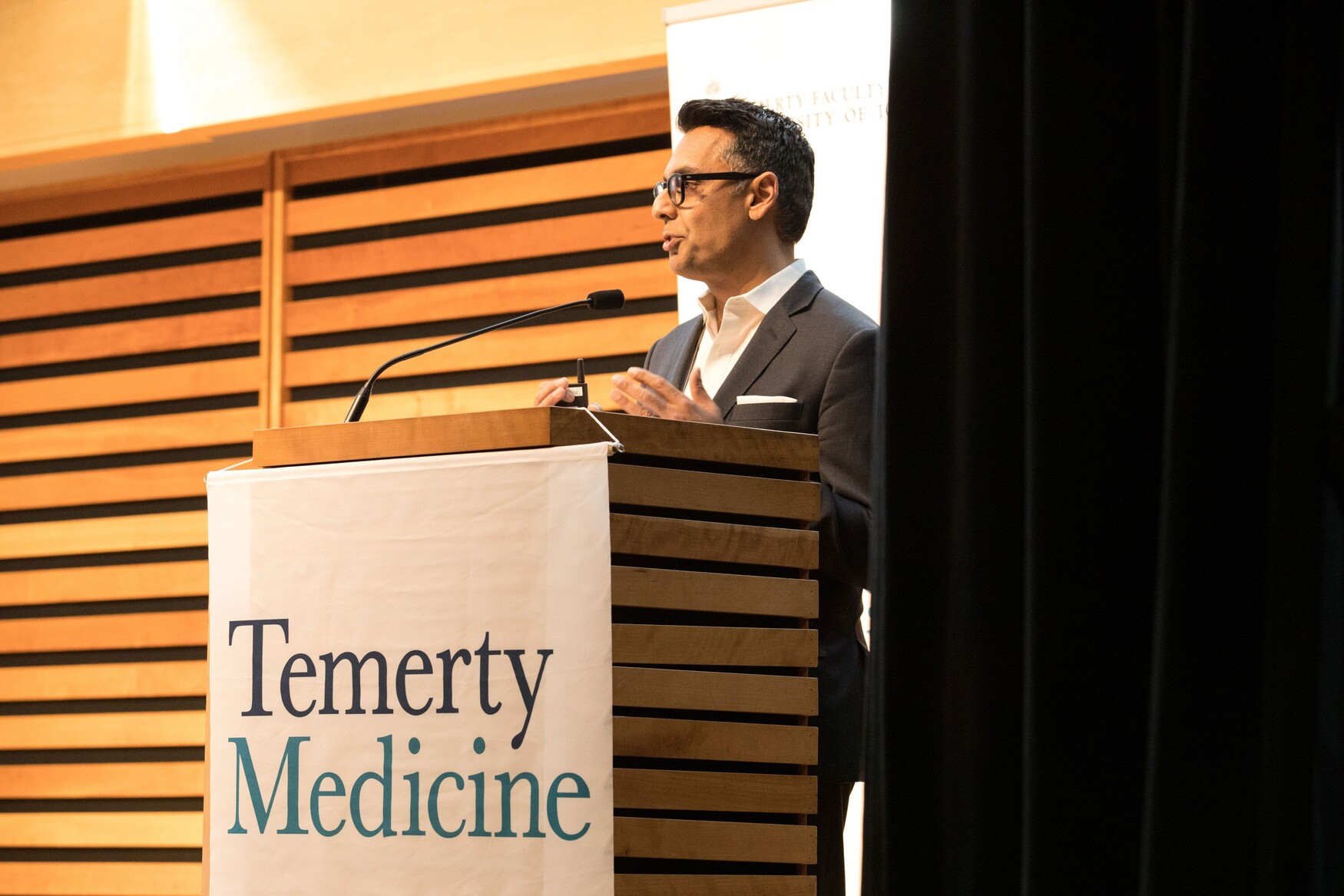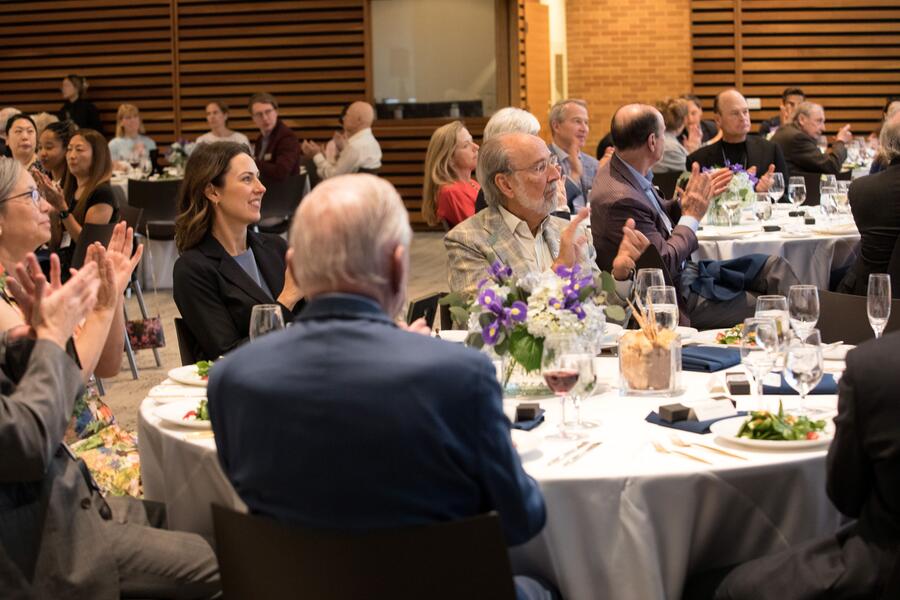Mobile Menu
- Education
- Research
-
Students
- High School Outreach
- Undergraduate & Beyond: Community of Support
- Current Students
- Faculty & Staff
- Alumni
- News & Events
- Giving
- About

The Temerty Faculty of Medicine’s annual Dean’s Lunch, hosted by Dean Trevor Young to thank and celebrate the Faculty’s most generous donors, is traditionally a relaxed, unrushed occasion. Yet, much of the focus of Kamran Khan’s keynote during the most recent event was the value of speed.
During his talk, Khan (MD’96) provided guests with an overview of his unconventional career path through medicine that ultimately led to him founding and leading BlueDot — a certified B company that seeks to identify, understand and respond to global biological threats faster and more effectively than ever before.
“Epidemics and pandemics move very quickly — spreading inadvertently by people as we travel around the world,” explained Khan, an infectious disease physician at Unity Health’s St. Michael’s Hospital and a Temerty Health Nexus Chair in Health Innovation and Technology at Temerty Medicine. “Today, access to big data and the refinement of machine learning is giving us the ability to get ahead of and move faster than outbreaks.”
After working on the front lines during the 2003 Toronto SARS outbreak, Khan was inspired to study transportation networks that connect people around the planet and are the conduit through which diseases spread geographically.
In the early days of 2009’s H1N1 pandemic, Khan published a predictive article in the New England Journal of Medicine about how the virus was anticipated to spread via airline travel. While his work provided an interesting snapshot of the evolving situation, by the time it was published just two weeks later, the virus had already moved on and his findings were no longer actionable.
That’s what inspired Khan to found BlueDot as a vehicle to translate the work he was doing as a scientist into real world impactful solutions and technologies. Harnessing technology, including artificial intelligence, he and his team have developed a global early warning system that identifies emerging outbreaks around the world, recognizes those that pose the greatest threat, anticipates their local and global trajectories, and disseminates timely, actionable insights to public and private sector decision makers.
Then came the moment everything coalesced: the early days of what would eventually be named COVID-19.
“In December 2019, we were picking up information about an unusual respiratory syndrome circulating in China’s Hubei Province,” says Khan. “We were able to notify all the organizations with whom we work a week ahead of any announcements from the World Health Organization, CDC or other health agencies.”
But knowing the threat existed wasn’t enough. By combining BlueDot’s data with Khan’s research on transportation networks, his team was able to rapidly connect where this outbreak was emerging to how populations at the epicentre were moving across the planet.
“We're really proud to have published the world's first peer reviewed study on COVID-19 — successfully predicting where the virus was most likely to spread next,” says Khan. “It immediately began shifting our thinking about the global risk the virus posed.”
Khan pointed out that his story is just one example of the innovative work underway at Temerty Medicine. As the Temerty Health Nexus Chair in Health Innovation and Technology, he is now working to inspire others in the Faculty to pursue entrepreneurial ventures, collaborating with partner institutions to lower barriers to innovation, mentoring new generations of entrepreneurs and nurturing stronger connections both within U of T’s and Toronto’s innovation ecosystems, as well as building national and international peer networks.
He concluded by thanking all those present for their support.
“The commitments you’ve made to the Temerty Faculty of Medicine are helping translate work that is making a difference not only here in Canada, but around the world.”
It’s a sense of optimism and gratitude that was echoed by Dean Young, who noted that the once annual Dean’s Lunch was being held for the first time since 2019 due to COVID-19.
“The last few years have provided a valuable new perspective on the importance of both our work and your support,” he told the audience of donors. “Thanks to your support, we were able to leverage our city-wide reach — responding quickly and effectively in service of our community when it was needed most. And now, with great delight, we can be together, and I can finally say thank you, in person, for all that you’ve done to get us here today.
Young also announced at the Dean’s Lunch that Temerty Medicine is officially more than halfway towards its $1.1 billion fundraising goal as part of U of T’s larger Defy Gravity Campaign. University-wide, the campaign seeks to engage more than 225,000 alumni as volunteers, mentors and donors more than one million times, while also raising a historic $4 billion.
“Temerty Medicine is a proud partner in this ambitious and impactful campaign which will advance our commitment to inclusive excellence and help us bring people together to create a healthier, more sustainable, and equitable world,” said Young.
“While the challenges we face are daunting, our community members, including Dr. Khan, have a long track record of finding solutions where others have not,” added Darina Landa, executive director of advancement at Temerty Medicine and the University’s Vice President, Advancement Relations with Health Care Institutions. “Thanks to your support, Temerty Medicine is shaping future health leaders and fueling new discoveries that can lead to life-changing gains in health, longevity and wellbeing for patients and communities everywhere.”


